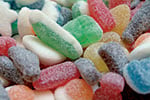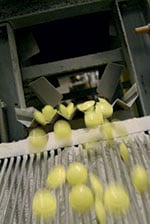Candy producer Astra Sweets
Astra Sweets, a leading candy producer in Belgium and Holland, keeps its operations sweet through trimmed and flexible manufacturing processes and a constant eye on the costs.
DATE 2023-11-28 AUTHOR Alexander FarnsworthSmart solutions for everything from production and packaging to waste management make Astra Sweets competitive in a low margin business. “Despite a recessive environment, people are still buying our candies. Our market share is growing and this is because we are studying ways to become more efficient,” says Kris De Vries, Technical Manager at Astra Sweets in Turnhout, Belgium.
The city of Turnhout is situated on the logistics crossroads between the port of Antwerp and major cities in Holland. Here Astra Sweets employs 230 people and produces 14 000 tonnes of candy a year (the average weight of a candy is between three and four grams.)
The Vanherpe family of Belgium owns the company in Turnhout, as well as two other Astra Sweets candy production facilities in Breda and Harlingen, Holland. The Vanherpe Group has a total of 2 000 employees. The family also has other milling and bakery interests in the Benelux countries.
Concentrates on candy
Astra Sweets dates back to 1987 when a company, then called Van Deun, was sold to the Vanherpe family. Van Deun specialized in baking gingerbread. The company also had a small candy-making operation. Their production facilities were centrally located in Turnhout, which were increasingly causing problems with neighbours at the time. So in 1989, the Vanherpe family moved their new gingerbread production facilities to their current location in an industrial park outside the city, and renamed the company Astra Sweets.
The gingerbread operations were subsequently sold off in 2000, and now the company concentrates solely on manufacturing candy. It is the kind of candy that every child in northern Europe, and increasingly elsewhere, will recognize.
Besides rolls of mints, bags of salt and sweet licorice, and other retail and point lavalof-sale products, Astra Sweets products include teddy bears, flying saucers, eggs, sour tongues, cola bottles, and a whole panoply of other jelly and gum-based products. It is the kind of candy that children pick up and choose at the candy store on Saturdays and fill up in individual bags. The candy is also distributed in different packaged forms through supermarkets.
200 different shapes
According to De Vries, Astra Sweets is the biggest producer of flying saucers or UFOs in the world. If you don’t know what a UFO is, ask your six-year old. Like a communion wafer, or a space capsule,a UFO is a candy that is basically a bubble of starch containing a flavoured sugar. Once in the mouth, it melts to release a strong and potent sour yet sweet flavour.
Astra Sweets acquired the company that originally made UFOs, Belgica TOP, in 1992.
 While Astra Sweets has three brand names – Faam (wine gums), Astra Sweets (UFOs and jelly gums), and Frisia (marshmallows) – the majority of their production is for private labels,or making products for other brands.
While Astra Sweets has three brand names – Faam (wine gums), Astra Sweets (UFOs and jelly gums), and Frisia (marshmallows) – the majority of their production is for private labels,or making products for other brands.
The kinds of candies that Astra Sweets produces are basically a combination of sugar,starch, gelatine, foam, water and colouring. The candy starts off as a paste, gets heated and cooled, and then gets moulded into shapes. Some shapes like Disney characters are patented, but teddy bears, cola bottles and tongues are free for anyone to make.
“We produce about 200 different shapes of candy,” says De Vries. “But the number of end products is many times larger since each product can be packaged in different ways.”
Astra Sweets runs two candy-making machines in parallel. One of them runs three shifts a day, five days a week, the other runs continuously three shifts per day. Both machines can produce upwards of 1 000 kilograms of candy per hour. Candy manufacturing is not a continuous process. Instead, up to 2 500 kilos of candy dough is processed in one batch.
About 25% of of Astra Sweets’ production is consumed in Belgium. The rest is exported to France, Germany, Holland, the U.K., Scandinavia and North America. Astra Sweets is certified by the British Retail Consortium,the French IFS organization and by the US’ HAACP, a food safety organization run by the FDA.
Productivity-enhancing measures
Like other consumer goods industries, the candy business is very susceptible to price pressures and low margins. According to De Vries, supermarkets in all of Astra Sweets’ markets are cutting prices, and this translates into a highly-competitive situation for producers. “This means that we have to continuously develop new products, find new raw materials, and produce more efficiently. We have to do the same or better with fewer resources,” he says.
One efficiency-yielding step was to install Alfa Laval Contherm scraped-surface heat exchangers for both candy-making lines. These ensure maximum runtime due to factors such as time-saving cleaning, inspection and maintenance.
Other efficiencies were gained when the packaging department went over to robotic operations. Instead of the previous procedure of manually loading candy bags into boxes, and then loading these boxes onto palettes that were moved to the warehouse awaiting distribution, robotic arms now do all the work and send the palettes away on automated conveyor belts.
The production of UFOs or flying saucers generates quite a lot of waste after the bubbles have been carved out of their starch sheets. In fact all waste generated by Astra Sweets that contains sugar and starch gets recycled as cattle feed.
Another industrial waste product is the water that has been used for cleaning all the vats and tubing for the candy production. Before, this water was handled by the local sewage system, but this was soon found to be too expensive. Instead, 300 tons of wastewater is collected daily on site in huge settling tanks. After a while the sugars in the water fall to the bottom, and trucks come frequently to remove the water. The sugary paste is disposed of separately.
Special customer requirements
Since the majority of Astra Sweets production is for private labels, the company constantly manufactures new products on customers’ specifications. Taste, packaging and marketing strategies are decisive factors for the success of a new product. One of the important jobs for the R&D Department of Astra Sweets is to give advice to its customers about shapes, recipes and packaging of new products.
Marc Boermans, R&D Designer at Astra sweets admits that the candy manufacturing business is pretty conservative. But he can also give evidence of how some customers want unusual products. On his desk in the R&D laboratory – a kind of mini production plant where most processes can be tested and measured – sits a batch of prototypes that were commercialized after the 2005 summer holidays. It is a back-to-school mix of candies shaped as letters, a calculator, a pencil sharpener and a backpack!
“When a customer asks for such special products, we do our best to see if we can manufacture and commercialize them,” says Boermans.
“But naturally we have certain limitations. The biggest candy we can make weighs 40 grams and the smallest 2 grams. When developing a new product we experiment with the proportions of glucose, sugar, gelatine, water and starch to get the best possible result.And then we test different starches from potato starch to tapioca starch to cornstarch. All of them give different end results.”
Alfa Laval / Astra Sweets cooperation
Candy paste or dough is made of water, sugar, starch, gelatine and other ingredients. It is a sticky product that can quickly block or foul certain types of heat exchangers.
 Astra Sweets in Turnhout, Belgium uses six Alfa Laval Contherm scraped-surface heat exchangers to both heat the dough to 120ºC for pasteurization and to cool it to 70ºC afterwards. The Contherm is designed for processing sticky, viscous or particulate products.
Astra Sweets in Turnhout, Belgium uses six Alfa Laval Contherm scraped-surface heat exchangers to both heat the dough to 120ºC for pasteurization and to cool it to 70ºC afterwards. The Contherm is designed for processing sticky, viscous or particulate products.
The product is pumped into the lower end of the Contherm cylinder. As it flows through the cylinder, it is continuously agitated and removed from the cylinder’s precisely-finished walls by scraping blades. This scraping action results in product heating and cooling with a high heat transfer rate without fouling.
“Contherm heat exchangers are ideal for Astra Sweets’ production process,” says Luc De Vlieger, Regional Sales Manager, Beverages and Viscous Food at Alfa Laval Belgium. “They preserve the taste, colour and texture of the product, they save floor space and cleaning, inspection and maintenance are easy.”
The Contherms allow Astra Sweets to skip daily cleaning routines, which could take hours of downtime with other types of heat exchangers. “We have lower maintenance costs as a result,” says Kris De Vries, Technical Manager at Astra Sweets.
